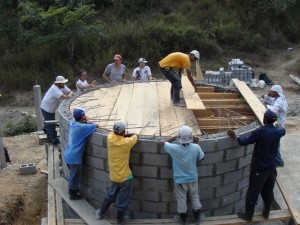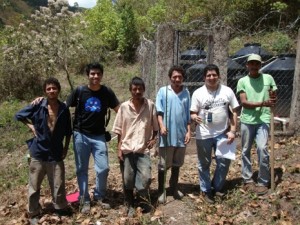
Students and villagers work on a 5,900-gallon water storage tank.
When he was a first-year student, Juan Hernandez ’13 (Vineland, N.J.) remembers receiving tons of emails soliciting new members for student clubs and organizations. The one from the student chapter of Engineers Without Borders (EWB) really caught his eye, and after learning more about its work in Honduras, he signed up.
“I was not an engineer, but I was amazed by the type of work those students did in a third world country,” says Hernandez, a neuroscience major. “This club was different. I’m a pre-med student, so I hoped that by joining EWB I would learn a lot of things I will never get to see inside a classroom.”
Hernandez traveled to the rural village of El Convento in Yoro, Honduras, in March to continue the chapter’s work installing a system to deliver clean water from mountain springs to a community of 42 families. Other students who visited in March include Joaquin Beltran ’11, who graduated May 21 with a B.S. in civil engineering; Eduardo Rodriguez ’14 (Santa Tecla, El Salvador); Juan Puerta ’12 (Bogota, Colombia), a mechanical engineering major; Megan Schultz ’12 (Dillsburg, Pa.), a mechanical engineering major; and Anthony Vecchio ’14 (Baldwinsville, N.Y.).
Hernandez says the most important aspect of the Honduras project isn’t necessarily the water system, but knowing that undergraduates can impact a community in such a positive way. It also reinforced his desire to attend medical school and become a neurosurgeon.
“Sometimes as students, we just focus on school and getting the best grades we can,” he explains. “Once we graduate, we get a job and continue on with our lives, but what about using what we know to help others? EWB and El Convento have really opened my eyes to some of the most important aspects in life, and that is a feeling of accomplishment because I know that we’re doing our best to change a community. This convinced me even more that I want to go into a profession where I can reach out to others.”

Eduardo Rodriguez ’14, second from left, and Joaquin Beltran ’11, second from right, with villagers in Honduras.
The chapter constructed a five-kilometer pipeline to each house in the community. Although El Convento’s population is 177, the system can serve 300 people. Ever since Hurricane Mitch destroyed the village’s small water-distribution system, community members have had to hike to the river each day to gather drinking water, bathe, and wash clothes. Once the system is complete, each family will enjoy clean, running water.
In January, Brian Carey ’11 made his second trip to Honduras to design and oversee the construction of a 5,900-gallon storage tank to hold filtered water before distribution. Others traveling to Honduras in January were Alec Bernstein ’11, who graduated with a B.S. in civil engineering; Washcarina Martinez ’11, who graduated with an A.B. in international affairs; civil engineering majors Kenneth Briotte ’13 (Merrick, N.Y.), Emily Clark ’12 (Kendall Park, N.J.), and Donovan Hayes ’12 (Harrisburg, Pa.); and Edwin Liriano ’14 (Bronx, N.Y.). Joshua Smith, assistant professor of mechanical engineering, accompanied them.
Community development was never on Carey’s radar until his first EWB trip to Honduras. That’s when he realized that the theories he was learning as a double major in civil engineering and economics were not only applicable in the real world, they could change lives. After an internship this summer with R3M Engineering, Carey will travel to Trinidad and Tobago on a 10-month Fulbright Grant to study the retrofit of non-engineered structures for seismic activity as well as the development of models for regional seismic risk calculation. When he returns, he plans to pursue his master’s degree in structural engineering.
“After experiencing the stark difference between life at home and life in Honduras, I immediately understood the importance of development work,” he says. “Once I made personal relationships with the community members, EWB’s work in El Convento became much more than computer models and workshops, lectures, and presentations. I wasn’t only meeting a deadline but helping a family with names and faces, so the work took on an entirely different importance. The decisions I make on paper and in computer models affect people.”
The tank was filled in March for cleaning but is currently empty. The chapter plans to return to El Convento in August to install five slow sand filters.

